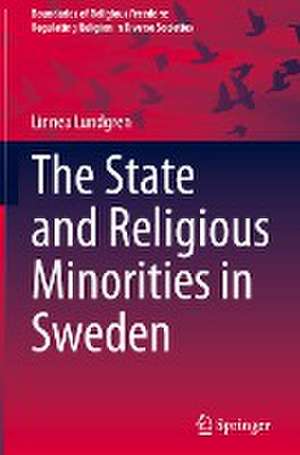The State and Religious Minorities in Sweden: Boundaries of Religious Freedom: Regulating Religion in Diverse Societies
Autor Linnea Lundgrenen Limba Engleză Hardback – 25 oct 2023
This book, a revised version of Lundgren’s PhD thesis, offers a deepened understanding of the changes in the governance of religious diversity and the complex relationship between state and religion. Linnea Lundgren explores how the narrative of risk and resource came to be by looking beyond the developments in the last few decades (particularly since 9/11) and analysing how the governance of religious diversity has developed over time. In particular, she focuses on the case of Sweden that is often regarded as one of the most secular countries in the world, while simultaneously being recognised as one of the most multi-religious countries in Europe due to a rise in immigration. This book reveals how the state has had a central role in setting the terms and conditions that both enable and limit what religious communities can do, thus shaping the function and role of religion in the public realm.
Through the analysis of an extensive number of government documents over a period of seventy years (1952-2022), Lundgren challenges the idea that many of the recent controversies concerning religious diversity are new. She argues that many of the discussions held today regarding the accommodation of Muslims are decidedly similar to previous discussions regarding the management of Catholics and the Free Churches in the 1950s and 1960s. She shows that the underlying fear has remained the same; that the individual’s rights can become weakened or diminished in religious communities and that religious minorities will challenge the common shared values of the society. In light of this Lundgren concludes that in order to understand what is really at stake in the debate regarding religious diversity in Sweden today, there is a need to look at underlying tensions that exist between the state, civil society and the individual, a relationship that differs considerably in the Nordic context compared to other contexts. This text appeals to students and researchers working in the sociology of religion and people who work with governance of religion, religion and civil society, and religion and law in Europe.
Preț: 696.68 lei
Preț vechi: 819.62 lei
-15% Nou
Puncte Express: 1045
Preț estimativ în valută:
133.33€ • 138.68$ • 110.07£
133.33€ • 138.68$ • 110.07£
Carte tipărită la comandă
Livrare economică 15-29 aprilie
Preluare comenzi: 021 569.72.76
Specificații
ISBN-13: 9783031421549
ISBN-10: 303142154X
Pagini: 154
Ilustrații: XI, 154 p.
Dimensiuni: 155 x 235 mm
Greutate: 0.41 kg
Ediția:1st ed. 2023
Editura: Springer International Publishing
Colecția Springer
Seria Boundaries of Religious Freedom: Regulating Religion in Diverse Societies
Locul publicării:Cham, Switzerland
ISBN-10: 303142154X
Pagini: 154
Ilustrații: XI, 154 p.
Dimensiuni: 155 x 235 mm
Greutate: 0.41 kg
Ediția:1st ed. 2023
Editura: Springer International Publishing
Colecția Springer
Seria Boundaries of Religious Freedom: Regulating Religion in Diverse Societies
Locul publicării:Cham, Switzerland
Cuprins
Inclusion and Exclusion of Religious Minorities.- The State, Civil Society and the Individual.- The State, The Church and Religious Minorities before 1952.- Policy Field of Religion-State Relations.- Policy field of Education.- Policy Field of Integration.- Continuity and Change in the Governance of Religion.- A Risk or a Resource? The Individual, the Religious Community and the State.
Notă biografică
Dr. Linnea Lundgren currently works as a lecturer at the Institution for Civil Society and Religion at Marie Cederschiöld University, Stockholm, Sweden. She is also affiliated with the Centre for Multidisciplinary Research on Religion and Society at Uppsala University, also in Sweden.
Textul de pe ultima copertă
This book, a revised version of Lundgren’s PhD thesis, offers a deepened understanding of the changes in the governance of religious diversity and the complex relationship between state and religion. Linnea Lundgren explores how the narrative of risk and resource came to be by looking beyond the developments in the last few decades (particularly since 9/11) and analysing how the governance of religious diversity has developed over time. In particular, she focuses on the case of Sweden that is often regarded as one of the most secular countries in the world, while simultaneously being recognised as one of the most multi-religious countries in Europe due to a rise in immigration. This book reveals how the state has had a central role in setting the terms and conditions that both enable and limit what religious communities can do, thus shaping the function and role of religion in the public realm.
Through the analysis of an extensive number of government documents over a period of seventy years (1952-2022), Lundgren challenges the idea that many of the recent controversies concerning religious diversity are new. She argues that many of the discussions held today regarding the accommodation of Muslims are decidedly similar to previous discussions regarding the management of Catholics and the Free Churches in the 1950s and 1960s. She shows that the underlying fear has remained the same; that the individual’s rights can become weakened or diminished in religious communities and that religious minorities will challenge the common shared values of the society. In light of this Lundgren concludes that in order to understand what is really at stake in the debate regarding religious diversity in Sweden today, there is a need to look at underlying tensions that exist between the state, civil society and the individual, a relationship that differs considerably in the Nordic context compared to other contexts. This text appeals to students and researchers working in the sociology of religion and people who work with governance of religion, religion and civil society, and religion and law in Europe.
Caracteristici
Contributes to the study of governance of religious diversity and shows importance of a risk/resource perspective Offers a more complex understanding of the regulation of religion by including the post-freedom of religion era Deepens the understanding of the changing relationship between religion and state in Sweden














